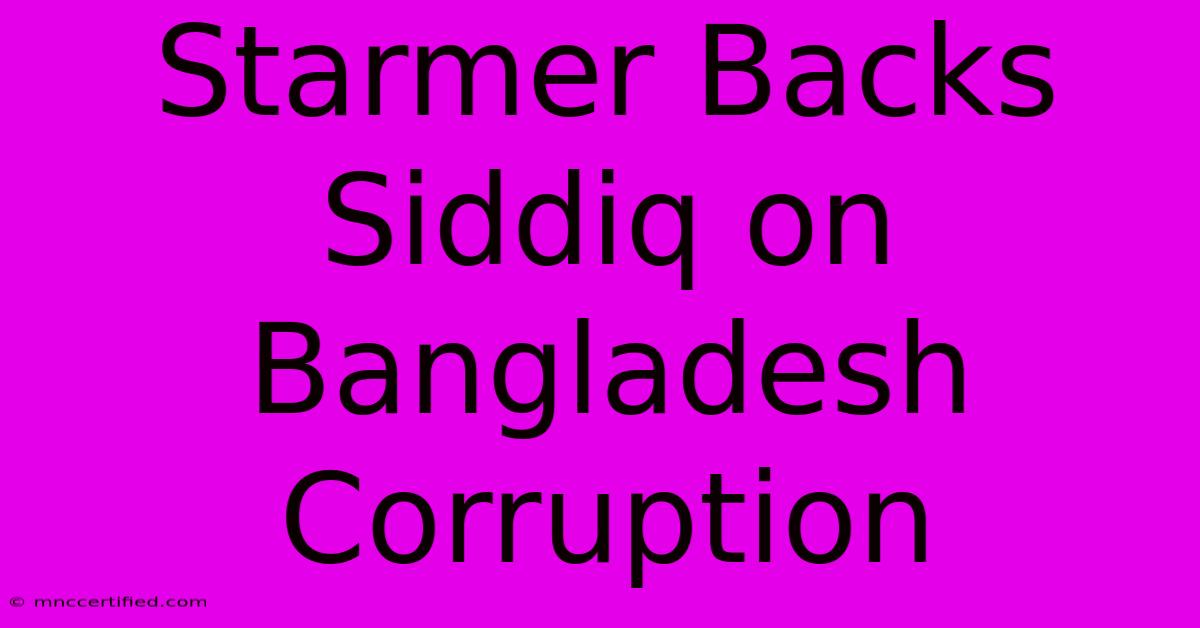Starmer Backs Siddiq On Bangladesh Corruption

Table of Contents
Starmer Backs Siddiq on Bangladesh Corruption: A Deep Dive into the Controversy
The recent statement by Keir Starmer, leader of the UK Labour Party, voicing support for Tulip Siddiq MP's concerns regarding corruption in Bangladesh has ignited a significant debate. This article delves into the specifics of the situation, exploring the nuances of the accusations, the political implications, and the broader context of UK-Bangladesh relations.
Understanding the Core Issue: Allegations of Corruption in Bangladesh
Tulip Siddiq, the Labour MP for Hampstead and Kilburn, has been a vocal critic of the current Bangladeshi government's handling of alleged corruption. Her concerns aren't new; they've been raised repeatedly over several years. These allegations encompass various sectors, including but not limited to:
- Public Procurement: Claims of favoritism and lack of transparency in awarding government contracts have been widely reported.
- Financial Irregularities: Allegations of embezzlement and misuse of public funds have fueled public distrust and international scrutiny.
- Human Rights Abuses: Critics argue that corruption often intertwines with human rights violations, impacting vulnerable populations disproportionately.
The specific details of these allegations are complex and often contested. However, the sheer volume of accusations, coupled with a perceived lack of accountability, has led to significant international concern.
Siddiq's Role and Starmer's Backing
Siddiq, known for her strong advocacy for human rights, has consistently raised these issues in Parliament and on international platforms. Her persistence has brought the concerns to the forefront of the UK political landscape. Keir Starmer's public endorsement of her stance signifies a clear position by the Labour Party, potentially influencing UK foreign policy towards Bangladesh.
Starmer's backing is significant for several reasons:
- Strengthening Siddiq's Position: It provides considerable weight to her criticisms, offering her a powerful platform to continue her advocacy.
- Setting a Political Tone: It signals Labour's commitment to tackling corruption on the international stage, and potentially influencing how the issue is handled by the UK government.
- Impact on UK-Bangladesh Relations: The stance could impact the diplomatic relationship between the UK and Bangladesh, potentially leading to increased pressure on the Bangladeshi government to address the allegations.
The Political Implications and Potential Fallout
Starmer's support for Siddiq presents several political challenges and opportunities:
- Potential for Diplomatic Tensions: The UK government may need to carefully navigate the situation to avoid damaging the bilateral relationship with Bangladesh. A strong condemnation of corruption risks harming trade and diplomatic ties.
- Domestic Political Considerations: Within the UK, Starmer's stance could alienate some voters who prioritize strong economic ties with Bangladesh over concerns about corruption.
- International Pressure: Starmer's support, coupled with similar concerns from other international actors, could exert significant pressure on the Bangladeshi government to initiate meaningful reforms.
Navigating a Delicate Balance
The challenge for both Starmer and Siddiq lies in balancing the need to address concerns about corruption with the need to maintain a constructive relationship with Bangladesh. A nuanced approach that acknowledges the complexities of the situation and avoids overly simplistic narratives will be crucial.
Conclusion: The Ongoing Debate
The debate surrounding corruption in Bangladesh and the UK Labour Party's stance is far from over. The coming months will likely witness further discussions, potential investigations, and ongoing pressure from various stakeholders. The situation underscores the intricate relationship between human rights, good governance, and international diplomacy. It remains to be seen how this controversy will ultimately shape UK-Bangladesh relations and the broader fight against corruption on a global scale.
Keywords: Keir Starmer, Tulip Siddiq, Bangladesh, corruption, human rights, UK foreign policy, Labour Party, public procurement, financial irregularities, international relations, diplomatic tensions, political implications, good governance.

Thank you for visiting our website wich cover about Starmer Backs Siddiq On Bangladesh Corruption. We hope the information provided has been useful to you. Feel free to contact us if you have any questions or need further assistance. See you next time and dont miss to bookmark.
Featured Posts
-
Virgin River Wedding Behind The Scenes
Dec 20, 2024
-
Warriors Fall Short Against Opponent
Dec 20, 2024
-
Monacos Singo Donnarumma Injury Regret
Dec 20, 2024
-
Warriors Green Makes Nba History
Dec 20, 2024
-
Curry Warriors Suffer Embarrassing Loss
Dec 20, 2024